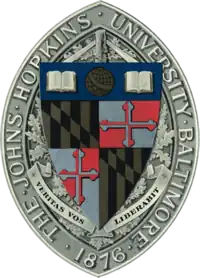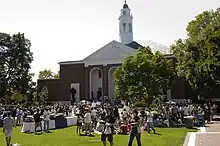| The Milton S. Eisenhower Symposium | |
|---|---|
 | |
| Genre | Student-run lecture series |
| Begins | September |
| Ends | December |
| Location(s) | Johns Hopkins University, Baltimore, Maryland |
| Inaugurated | 1967 |
| Attendance | 900 per event |
| Organized by | Siena DeMatteo, Taran Krishnan, Mickey Sloat, and Dave Taylor |
| Website | www |
The Milton S. Eisenhower Symposium is a lecture series sponsored by Johns Hopkins University. The Symposium runs each year over the course of the fall semester, as a counterpart to the Foreign Affairs Symposium.
History
Established in 1967, the MSE Symposium is designed to present an issue of national importance to the university in its entirety, as well as to the Baltimore and Washington D.C. communities. The series is named in honor of Milton S. Eisenhower, who served as University President from 1956-1967 and again from 1971-1972. He was the younger brother of U.S. President Dwight D. Eisenhower. The Symposium has established a reputation as a forum for the free exchange of ideas and the analysis of issues at the forefront of the nation’s conscience. All events are free and open to the public.[1]
Leadership
The Symposium is run entirely by undergraduate students at the University’s Homewood Campus. The co-chairs are responsible for choosing a theme, securing speakers, raising the necessary funds, recruiting a student staff, and publicizing the series. There is a staff of about 20 students.[2][3] The chairs for the 2019 symposium are Siena DeMatteo, Taran Krishnan, Mickey Sloat, and Dave Taylor.
Symposium structure

Symposium events are held on the Homewood Campus of the Johns Hopkins University. Each speaker delivers an address to attendees, usually followed by a question-and-answer session with the audience. Additionally, some speakers hold a meet and greet session with the audience after the event.
Symposium themes
2019
"The Butterfly Effect"
Shannon Watts, gun control activist and founder of Moms Demand Action; Kenan Thompson, comedian and SNL cast member; Jim Acosta, journalist and CNN Chief White House Correspondent; Farida Nabourema, activist and blogger.
Chairs: Siena DeMatteo, Taran Krishnan, Dave Taylor, and Mickey Sloat
2018
"The New Social Contract"
Chairs: Alex Kaplan, Alejo Perez-Stable Husni, Indira Rayala, and Maddy Speal
2017
"Celebrating 50 Years"
Chairs: Rachel Biderman, Abby Biesman, Charles Crepy, and Tiffany Le
2016
"Facing Fracture"
Chairs: Sam Sands, Theodore Kupfer, Olivia Choi, and Eyal Foni
2015
Voices that Shaped Today, Visions that Frame Tomorrow
Chairs: Jeremy Fraenkel, Nicole Michelson, Ariel Zahler, and Nadeem Bandealy
2014
The Generation Electric: Recharging the Promise of Tomorrow
Chairs: Annabel Barnicke, Daniel Elkin, P. Nash Jenkins, and Connor Kenehan
2013
Learning from Experience: The Path Ahead for Generation Y
Chairs: Aidan Christofferson, Aaron Tessler, Francesca Pinelli, and Elias Rosenblatt[4]
2012
The Power of the Individual: How One Voice can Change the World
Chairs: Chris Alvarez, Corey Rogoff, Eva Marie, and Najarro Smith
2011
America's Boundless Possibilities: Innovate, Advance, Transform
Chairs: Jonathan Kornblau, Elizabeth Goodstein, and Jon Mest
2010
The Global Network: America's Changing Role in an Interconnected World
Chairs: Mohammad Elsayed, Danielle Calderone, and Nicole Ackerman
2009
A Transition Between Generations in a Changing America
Chairs: Danielle Fair, Michelle Harran, and Daniel Ingram
2008
A More Perfect Union: Partnership, Progress & Prosperity
Chairs: Omar Atassi, Zachary Epstein-Peterson, Brian Kim, and Lily Seidel
2007
Renewing American Culture: The Perspectives that Shape our Identity
Chairs: Jon Bernhardt, Jonathan Collins, and Nora Krinitsky
2006
Finding Our Voice: The Role of America's Youth
2005
American Mass Media: Redefining the Democratic Landscape
2004
Rebuilding America: Peace and Prosperity at What Price?
2003
The Great American Experiment: a Juxtaposition of Capitalism and Democracy
1999
Redefining the Role of the Media
Noah Wyle and Eriq La Salle of the ER (TV series), Dr. Drew Pinsky, co-host of Loveline, the popular show on both radio and MTV; Supreme Court Justice Antonin Scalia, of the United States Supreme Court; Oliver Stone, Academy Award-winning American screenwriter and filmmaker's credits include Born on the Fourth of July, JFK, Platoon, Natural Born Killers and Wall Street; Phoebe Eng, author of Warrior Lessons: An Asian American Woman's Journey Into Power. She is also the co-founding publisher of A. Magazine, a national consumer magazine targeted to the Asian population in the U.S.; Nadine Strossen, president of the American Civil Liberties Union in 1991. A professor of law at New York Law School, she has written, lectured and practiced extensively in the areas of constitutional law, civil liberties and international human rights.
1995
Framing Society: A Century of Cinema
Chairs: Chris Aldrich and Matt Gross[7]
1993
Who Am I? The Changing Role of Human Sexuality
Chairs: Aneesh Chopra and Joe Molko[8]
1973
Living With Change
Former speakers
The Symposium has a history of attracting some of the world’s most prominent leaders, politicians, artists, and scholars. Past MSE Symposium speakers include:[9]
- Jason Alexander
- Maya Angelou
- Aziz Ansari
- Sean Astin
- David Axelrod
- Michael Bloomberg
- Cory Booker
- Tucker Carlson
- Ben Carson
- Rubin “Hurricane” Carter
- Noam Chomsky
- Tom Clancy
- Francis Collins
- Ann Coulter
- Howard Dean
- Michael Dukakis
- Elizabeth Edwards
- Ruth Faden
- Will Ferrell
- Gerald Ford
- Buckminster Fuller
- Newt Gingrich
- Malcolm Gladwell
- Danny Glover
- David Alan Grier
- Christopher Hitchens
- David Horowitz
- Jon Huntsman, Jr.
- Jesse Jackson
- John Kasich
- Rory Kennedy
- Nelson Mandela
- N. Gregory Mankiw
- Chris Matthews
- Eugene McCarthy
- Gail McGovern
- Seth Meyers
- Hasan Minhaj
- Michael Moore
- Wes Moore
- Ralph Nader
- Edward James Olmos
- Ron Paul
- Charles Percy
- Craig Robinson
- Karl Rove
- Linda Sarsour
- Antonin Scalia
- Congressman Aaron Schock
- Michael Steele
- Megan Twohey
- Jimmy Wales
- Dr. Ruth Westheimer
- Jessica Williams
- Valerie Plame Wilson
- Bob Woodward
- Howard Zinn
See also
References
- ↑ "History of the MSE Symposium". Johns Hopkins University.
- ↑ "The 2008 MSE Symposium at Johns Hopkins University". Johns Hopkins University.
- ↑ "MSE Staff". Johns Hopkins University.
- ↑ "Christofferson, Rosenblatt to share MSE position". Johns Hopkins University.
- ↑ "The Johns Hopkins Gazette: September 13, 1999".
- ↑ "Headlines@Hopkins: Johns Hopkins University News Releases".
- ↑ Rice, Leslie (September 18, 1995). "MSE Symposium Considers the Cinema at 100". Johns Hopkins Gazette. Baltimore, MD. Retrieved August 8, 2018.
- ↑ Smith, Linell (September 17, 1993). "Sexuality, attitudes on center stage at Hopkins symposium". Baltimore Sun. Baltimore, MD. Retrieved August 8, 2018.
- ↑ "History of the MSE Symposium". Johns Hopkins University.